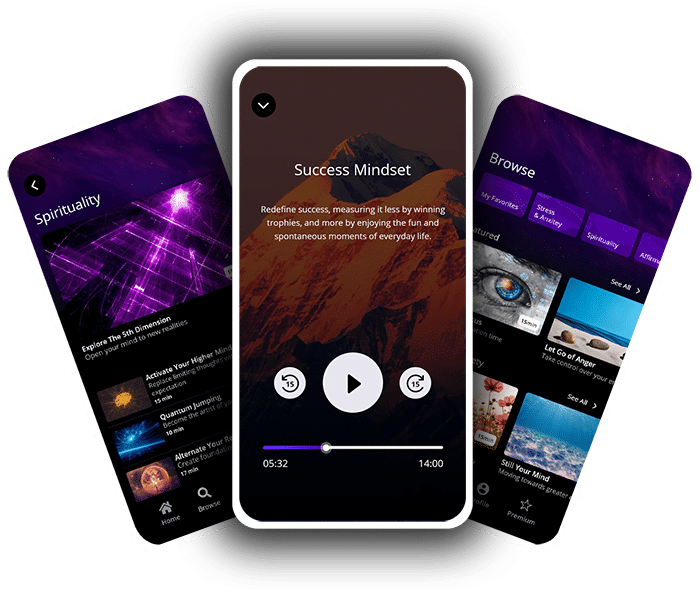Are you struggling with sleepless nights due to anxiety? Research shows that as many as 40% of people have occasional insomnia, and meditation might be just the remedy you need. This article will guide you on how to use different types of meditation specifically designed not only to help improve your sleep quality, but also reduce anxiety levels.
Here’s the 30 minute guided meditation for sleep and anxiety:
Ready for a good night’s sleep? Keep reading!

Unleash Your True Potential!
Explore the world of meditation with our powerful guided sessions crafted to bring peace and strength to your spirit.
But first, let’s ensure our sessions are the perfect fit for you.
Take our short quiz to find out!
Table of contents
Key Takeaways
- Meditation is great and effective tool for managing anxiety and improving sleep quality.
- Different types of meditation, such as sleep guided meditations, NSDR, mindfulness, and mantra meditation, can help with sleep and anxiety relief.
- Meditation reduces stress and anxiety levels, promotes relaxation, and improves the overall quality of sleep.
- To practice meditation for sleep and anxiety relief, find a quiet space, focus on your breath, use guided meditations or positive affirmations.
Understanding the Connection Between Sleep and Anxiety
Anxiety can greatly impact sleep, leading to difficulty falling asleep, frequently waking during night, and overall poor sleep quality. However, meditation has been proven to be an effective tool for managing anxiety and promoting better sleep.
How anxiety can affect sleep
Anxiety can mess up your sleep. It stirs up thoughts and worries in your mind that keep you from falling asleep. Even when you fall asleep, anxiety can wake you up during the night.
It makes it hard to get good, sound sleep. Without enough rest, feelings of fear or worry may get worse. The goal is for both body and mind to relax so a good night’s sleep can happen.
Different Types of Meditation for Sleep and Anxiety Relief
There are various types of meditation that can help with both sleep and anxiety relief, such as guided meditation, mindfulness meditation, and mantra meditation.
Guided meditation
Guided meditation is a great tool for sleep and anxiety relief. It helps to calm your mind and give you better sleep. You follow the voice of a guide in this kind of meditation. This makes it easier to start, even without learning special methods.
Research shows that guided meditation can improve how well you sleep by calming stress and worry. Use it every day as a part of your routine for the best results.

Unleash Your True Potential!
Explore the world of meditation with our powerful guided sessions crafted to bring peace and strength to your spirit.
But first, let’s ensure our sessions are the perfect fit for you.
Take our short quiz to find out!
Mindfulness meditation
One type of meditation that can be helpful for sleep and anxiety is mindfulness meditation. Mindfulness meditation combines elements of mindfulness-based stress reduction with cognitive behavioral therapy.
It teaches individuals to slow down racing thoughts, mental chatter, let go of negativity, and calm both the mind and body. Research has shown that practicing mindfulness meditation with consistency can calm the mind and promote better quality sleep.
By focusing on the present moment and observing thoughts without judgment, mindfulness meditation can help reduce anxiety and improve overall well-being.
Mantra meditation
Mantra meditation is a type of meditation that uses the repetition of phrases or mantras to help you focus your mind and set positive intentions. It is a simple yet extremely effective practice that can be done by anyone, whether you are new to meditation or have been practicing for a while.
By repeating these phrases silently or out loud, you create a sense of calmness and relaxation in your mind and body. This form of meditation has been found to be very beneficial for reducing stress, improving sleep quality, and managing anxiety.
It can also help lift your mood and bring about inner peace. So, if you’re looking for a way to find more tranquility in your life, mantra meditation may be just what you need.
Benefits of Meditation for Sleep and Anxiety
Meditation offers numerous benefits for both sleep and anxiety relief. It reduces stress and anxiety levels, promoting a sense of calm and relaxation. Additionally, it improves the quality of sleep by helping individuals fall asleep faster and experience deeper, more restful sleep.

Reduces stress and anxiety
Meditation is an easy tool that can reduce stress and anxiety. When you practice meditation, it allows your mind to focus on the present moment, giving you a break from the worries and stress of everyday life.
Research has shown regular meditation practice can decrease levels of the stress hormone cortisol in the body, leading to a sense of calm and relaxation. Additionally, meditation helps to activate the body’s relaxation response, which can lower heart rate and blood pressure.
By incorporating meditation in your routine, you can experience greater peace of mind and an overall reduction in stress and anxiety levels. So why not give it a try?
Promotes relaxation
Meditation promotes relaxation by calming your mind and reducing stress and anxiety. When you engage in meditation, your body enters a state of deep relaxation, allowing you to release tension and find inner peace.
Research has shown that meditating regularly can lower stress levels, enhance mood, and improve sleep quality. By focusing on your breath or even using guided meditations, you can easily bring yourself into a state of calm and tranquility.
With consistent meditation practice, you can experience the benefits of relaxation not only during your sessions but also in your everyday life. Meditation is a powerful tool for finding serenity amidst the chaos of daily life and promoting overall well-being.
Improves sleep quality
Meditation can enahnce the quality of your sleep. When you practice meditation, it helps to calm your mind as well as relax your body, making it easier for you to fall asleep and stay asleep throughout the night.
Additionally, studies have shown that mindfulness meditation can improve sleep quality, similar to exercise or other relaxation techniques. So, if you’re struggling with getting a good night’s sleep due to anxiety or stress, incorporating meditation into your bedtime routine may be beneficial for enhancing the overall quality of your sleep.
Remember, meditation is a natural and drug-free approach that can help promote better sleep without any negative side effects.
How to Meditate for Sleep and Anxiety Relief

Find a nice quiet and comfortable space, focus on your breath, use guided meditation, and incorporate positive affirmations. Learn more about these techniques to achieve better sleep and reduce anxiety.
Find a quiet and comfortable space
To get the most out of your meditation for sleep and anxiety relief, it’s important to find a quiet and comfortable space. Look for a place where you won’t be disturbed, so you can just focus on your practice.
It could be a cozy corner in your home or even outside in nature. By creating this serene environment, you’ll be able to calm your mind and find inner peace more easily during meditation.
Remember that finding a comfortable position is key too – whether sitting cross-legged on a cushion or lying down – choose what feels best for you. Having this tranquil space will not only improve the effectiveness of your meditation but also promote better quality sleep in the long run.
Focus on your breath
Focusing on your breath can be a simple yet extremely powerful way to reduce stress and anxiety. When you take the time to pay attention to your breath, it helps bring you into the present moment and calms your mind.
Additionally, deep breathing can activate the relaxation response in your body, reducing tension and promoting a sense of calm. By incorporating breath-focused meditation into your routine, you can experience improved sleep quality and better overall mental health.
Remember that focusing on your breath is an easy tool that you can use anytime, anywhere, to alleviate stress and promote relaxation.
Use a guided meditation
To help you with sleep and anxiety relief, one effective type of meditation is guided meditation. Guided meditations provide step-by-step instructions and soothing guidance, making it easier for you to relax and find calm.
It’s also easy to find free guided meditations online or you can download apps like Enhanced meditation app that offer a variety of options specifically designed for sleep and anxiety relief. These guided sessions typically include calming music, gentle verbal cues, and visualization techniques to help ease your mind and release tension.
By following along with a guided meditation, you can experience deep relaxation, reduce stress levels, and promote better sleep quality.
Incorporate positive affirmations
To enhance the effectiveness of meditation for sleep and anxiety relief, it is important to incorporate positive affirmations. Affirmations involve repeating positive statements, which can promote a positive mindset and help alleviate anxiety.
You can write your own affirmations or find pre-recorded guided meditation videos that include affirmations. Scientifically proven to be effective, positive affirmations are a powerful tool in rewiring your thoughts and internalizing positive messages.
Consistently practicing these affirmations for a period of time, such as 21 days, can have long-lasting benefits for better sleep and reduced anxiety levels.
30 Minute Meditation for Sleep and Anxiety Relief
In this section, you will find step-by-step instructions on how to practice a 30-minute meditation for sleep and anxiety relief. You will also discover helpful tips and techniques to enhance your experience, as well as recommended meditation music to create a tranquil atmosphere.

Step-by-step instructions
To start the 30-minute meditation for sleep and anxiety relief, find a quiet and comfortable space where you can relax without distractions. Sit or lie down in a position that feels comfortable to you.
Close your eyes and take a few deep breaths to help calm your mind and body.
Next, bring your awareness to your breath. Notice this sensation of the air entering and leaving your body as you breathe naturally. Allow yourself to fully focus on each inhale and exhale, letting go of any thoughts or worries that may arise.
Now, if you’re new to meditation or prefer some guidance, use a guided meditation recording or app. This will provide gentle instructions and visualization techniques to help you relax deeply.
As you continue with the meditation, incorporate positive affirmations into your practice. Repeat calming statements in your mind such as “I am safe,” “I am relaxed,” or “I let go of all tension.” These affirmations can help shift your focus to relaxation and reduce anxiety.
Helpful tips and techniques
To get the most out of your meditation for sleep and anxiety relief, here are some helpful tips and techniques to keep in mind:
1. Find a nice quiet and comfortable space: Choose a peaceful environment where you won’t be easily distracted. This could be a dedicated meditation area or simply a spot in your home that feels calm and relaxing.
2. Focus on your breath: One of the foundations of meditation is bringing attention to your breath. Take deep slow breaths, focusing on the sensation of each inhale and exhale. This helps center your mind and bring about a sense of relaxation.
3. Use a guided meditation: If you’re new to meditation or find it hard to focus on your own, try using guided meditations specifically designed for sleep and anxiety relief. These audio recordings provide instructions and visualizations that can help ease stress and promote better sleep.
Recommended meditation music
To enhance your meditation experience for sleep and anxiety relief, it is recommended to include calming and soothing music. Relaxing music has been found to promote relaxation and create a peaceful environment.
Instrumental tracks with a slow tempo, such as classical, light jazz, or gentle stringed tunes, are often preferred for relaxation at home. You can also explore nature soundscapes or guided meditation tracks that incorporate soft background music.
Remember to choose music that resonates with you personally and helps you feel calm and focused during your practice.
Conclusion
In conclusion, meditating is a great for both sleep and anxiety relief. It can reduce stress, promote relaxation, and improve the quality of your sleep. By incorporating a 30-minute meditation practice into your routine life, you can experience the benefits of calmness and tranquility that will support better restful nights and reduced anxiety levels.
So why not give it a try? Start meditating today and enjoy a peaceful mind and deep rejuvenating sleep tonight!
FAQs
What can help with my sleep and anxiety?
Meditation for anxiety and sleep can be a big help.
Is there any free guidance I can use for meditation?
Yes, you can find free guided meditation for sleep and anxiety on many websites.
How does guided meditation work for my anxiety and trouble sleeping?
Guided meditation for sleep helps calm your mind while easing your anxious feelings, helping you get better rest.
Can I do a quick session of guided meditation before bed?
Absolutely! Even just 30 minutes of guided meditation for sleep and anxiety relief is enough to see benefits.










